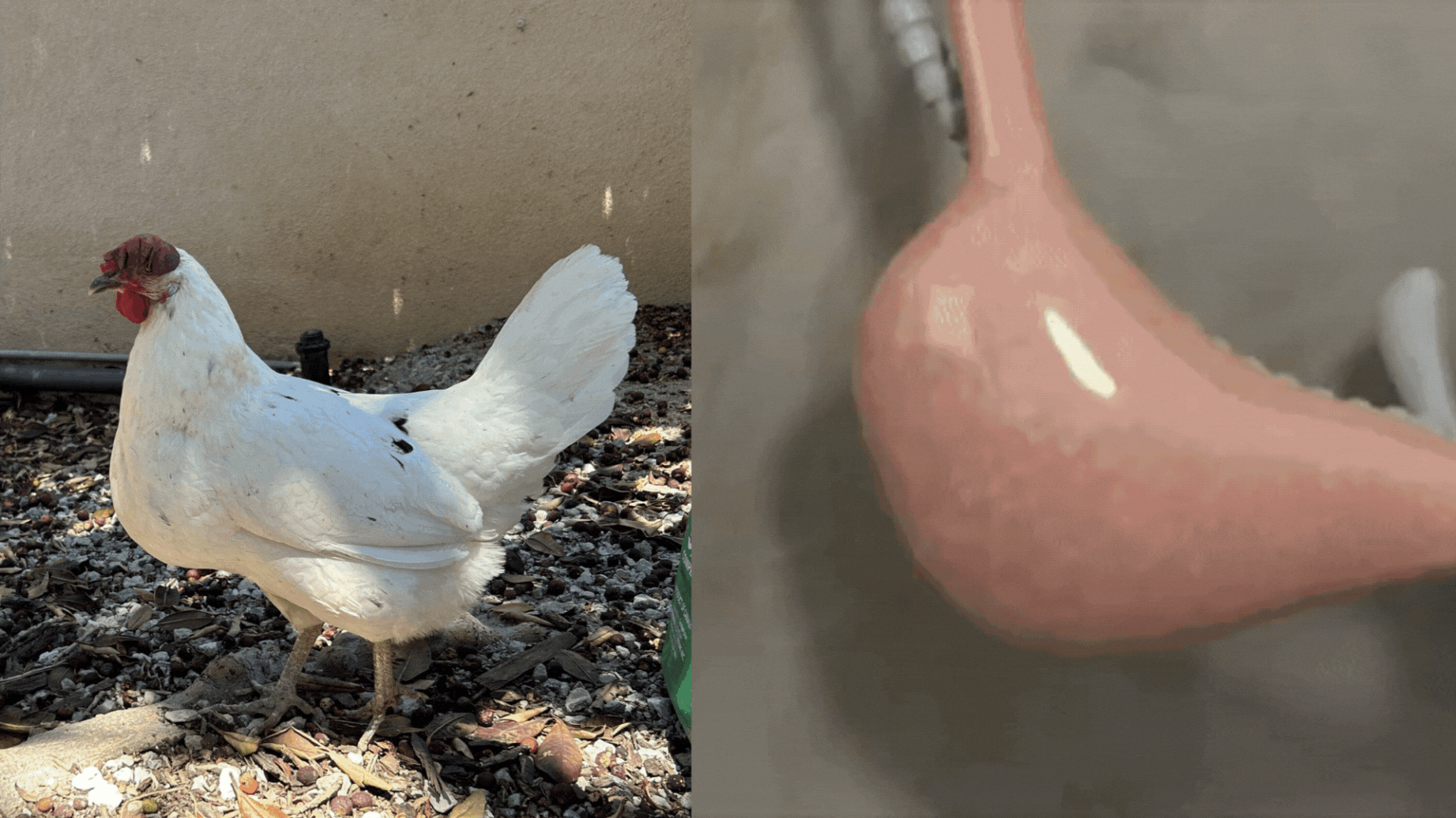How to Treat Sour Crop and Impacted Crop in Chickens: Complete Care Guide
When it comes to keeping chickens happy and healthy, knowing a thing or two about the crop can make a big difference. The crop is like a small food pouch, where a chicken stores its meal before it moves down to the stomach. This little holding area lets chickens eat fast, then digest at their own pace – which makes crop health pretty important for the overall well-being of your flock!
Among these, sour crop and impacted crop are two common conditions that can affect the well-being of chickens. Understanding these conditions, their symptoms, diagnosis, treatment options, and prevention strategies is essential for any poultry farmer.
What is Sour Crop in Chickens?
Sour crop occurs when food in the crop ferments due to a fungal overgrowth, typically Candida albicans. This leads to gas buildup, a foul odor, and discomfort for the chicken. Understanding the causes, such as poor diet or prolonged crop stasis, is key to prevention and early intervention. Prompt treatment, including crop massage and antifungal remedies, can significantly improve recovery. In the following sections, we’ll cover symptoms, diagnosis, and treatment options in detail.
Chicken Sour Crop Symptoms
Recognizing sour crop in chickens symptoms early is crucial for effective intervention. Sour crop is a fungal infection that can significantly impact a chicken's appetite, energy levels, and overall health. The stress of treating sour crop in chickens can also affect their well-being. It's essential to be aware of the signs of sour crop in chickens to ensure timely care. By identifying these signs early, you can take the necessary steps to help your chickens recover.
Foul-Smelling Breath: A distinct, sour or rotten odor can be detected from the chicken's beak, caused by fermentation of food trapped in the crop.
Swollen Crop: The crop may feel unusually squishy, hard, or bloated when touched, especially in the morning when it should be empty.
Lethargy: Chickens with sour crop often show signs of fatigue, moving less and appearing uninterested in their surroundings.
Loss of Appetite: A chicken with sour crop often refuses to eat, a tell-tale sign that something is amiss in their digestive system and that intervention is needed.
Regurgitation of Undigested Food: Food may come back up, or a chicken may attempt to "spit" undigested contents, sometimes accompanied by gurgling sounds.
Diarrhea: Sour crop poop may be runny, mucous-like, or have an off-putting smell, indicating digestive irregularities caused by the fungal imbalance in the crop. Monitoring droppings can provide early warning signs, as changes in consistency and odor often point to crop disorders.
Understanding these sour crop symptoms in chickens enables faster identification and treatment, helping ensure a healthy recovery.
Causes of Sour Crop in Chickens
Fungal Overgrowth: Typically caused by Candida albicans.
Poor Diet: Overfeeding, stale/moldy feed, or lack of grit for digestion.
Prolonged Crop Stasis: Crop not emptying properly due to underlying health issues.
Stress or Illness: Weakened immune system affecting crop function.
Dirty Water or Feeders: Promotes bacterial or fungal growth.
Antibiotic Use: Can disrupt the balance of gut flora, leading to fungal overgrowth.
Continue reading for advice on treatment of sour crop in chickens!
What is Impacted Crop in Chickens?
On the other hand, chicken crop impaction occurs when the crop, a pouch in the chicken's throat where food is stored before digestion, becomes blocked or obstructed. This blockage prevents food from passing through the digestive system, leading to discomfort and potential health issues if left untreated. A chick with impacted crop is a common issue, especially in young chickens that tend to eat a lot. The crop should be very full at night and gradually empty by morning as the food is digested. However, if large food particles, foreign objects, or excessive dry feed are ingested, food can become stuck in the crop, resulting in an impacted crop. Understanding what is impacted crop is important for effective treatment, as prompt attention can help alleviate discomfort and prevent further complications.
Marketplace
You might also be interested in...

Shop for chickens, livestock or other farm goods

About Farm Expo Events

Sell Your Chicks and Eggs
Symptoms of Impacted Crop
Crop impaction in chickens occurs when the crop becomes blocked, preventing food from passing through the digestive system. Recognizing the symptoms early can make a significant difference in the health of your flock. Here are some common impacted crop symptoms in chickens:
Hard, swollen crop
Inability to eat or drink
Weight loss
Signs of distress or discomfort
Vomiting or regurgitation
When it comes to impacted crop chick, these symptoms can be especially worrisome due to their small size and higher vulnerability. It's essential to monitor young birds closely for any signs of distress, as impacted crop baby chick can quickly become serious.
Comparing Sour Crop vs Impacted Crop
Although sour crop and impacted crop both affect a chicken's crop, they are distinct conditions, each with unique causes and treatments. Understanding these differences is important for providing effective care.
Sour crop is characterized by fermentation and foul odor, while impacted crop is marked by a blockage and hard crop.
Sour crop often results from dietary issues, whereas impacted crop can result from physical obstructions.
Understanding the symptoms and differences between sour crop and impacted crop is vital for any chicken owner. By recognizing the signs early and providing appropriate chicken sour crop treatment or crop impaction chicken treatment,you can ensure the health and well-being of your flock. Always keep a close eye on your chickens, especially baby chicks, to catch any issues before they become severe.
How to Diagnose
Diagnosing sour crop and impacted crop involves a combination of physical examination and observation of symptoms. Here are the steps to follow before going to a veterinarian:
Observe Behavior: Look for signs of distress, lethargy, or changes in appetite.
Examine the Crop: Gently palpate the crop to check for hardness or swelling.
Check for Vomiting: Note if the chicken is regurgitating food or has foul-smelling breath.
Consult a Veterinarian: If symptoms persist, seek professional help for a proper diagnosis.
A veterinarian may palpate the crop to assess its size and consistency. Additionally, a thorough history of the chicken's diet and behavior can provide valuable insights. In some cases, further diagnostic tests may be necessary to rule out other health issues.
How to Treat Sour Crop and Impacted Crop
Caring for chickens means sometimes facing common health issues like sour crop and impacted crop. Understanding the symptoms of sour crop in chickens and also the impacted crop chicken symptoms, early and knowing how to treat sour crop chickens can make a big difference in your flock's health. This section will cover effective chicken impacted crop treatment and sour crop in chickens treatment options, including home remedies, medications, and treatments, as well as techniques for massaging the sour crop.
How to Fix Sour Crop in Chickens
How to treat sour crop in chickens: Understanding how to fix sour crop in chickens involves a few key steps. First, isolate the chicken and ensure it has access to clean water. Gently massaging the crop can help release trapped gas and food. Offering probiotics like yogurt supports the digestive system. Administering antifungal treatments may also be necessary. So, how do you treat sour crop in chickens? Early intervention with these methods is vital for a speedy recovery.
How to Fix and Clear an Impacted Crop in Chickens
If you notice signs of crop impaction, knowing how to fix impacted crop chicken is crucial. Start by isolating the affected chicken and providing plenty of fresh water. You can also gently massage the crop to help break up the blockage. In some cases, administering a small amount of vegetable oil can lubricate the digestive tract. For severe cases, consult a veterinarian to learn how to clear impacted crop in chicken effectively.
Natural and Home Remedies
If you’re looking for home remedies for sour crop in chickens, there are several methods that may help. When it comes to sour crop cures, there are several strategies you can implement. Here are some effective options to try if you suspect one of your chickens has sour crop.
Apple Cider Vinegar for sour crop: Apple cider vinegar (ACV) is a popular home remedy. It can help in balancing the pH levels in the crop. The recommended dosage is usually around 1 tablespoon of apple cider vinegar per gallon of water. This is often referred to as "ACV for sour crop."
Baking Soda for sour crop: Baking soda can be used to neutralize the acidity in the crop. However, it should be used cautiously and preferably under the guidance of a vet.
Garlic Water for sour crop: Garlic water is a natural remedy believed to have antimicrobial properties. It can be made by crushing garlic cloves and mixing them with water. This mixture, known as "garlic water for chickens sour crop," can be given to chickens to help combat infections.
Yogurt and probiotics: A key sour crop food for recovery is probiotics, as they support healthy gut bacteria essential for digestion. Adding plain yogurt to your chicken's diet can help restore this balance and promote better digestive health.
On the other hand, for a chicken with impacted crop, there are several ways to help in managing it at home if caught early. Here's how to fix impacted crop:
Vegetable oil: Vegetable oil can help lubricate the digestive tract and facilitate the movement of food through the crop. Administer a small amount (about 1 teaspoon) of vegetable oil directly into the chicken's beak using a syringe or dropper.
Watermelon: If your chicken is willing to eat, offer soft foods that are easier to digest. Watermelon is the best option as a hydrating and soft food which can help stimulate the digestive system. The high water content can help soften the contents of the crop and encourage movement, making it easier for the chicken to pass the blockage.
Fasting: In some cases, it may be beneficial to withhold food for a short period (12-24 hours) to allow the crop to empty. Ensure your chicken has access to fresh water during this time.
For mild cases, home remedies like massaging the crop and administering oil or probiotics can be effective. However, if symptoms persist or worsen, such as persistent swelling, refusal to eat, or signs of severe discomfort, consulting a veterinarian is crucial.
Massaging the Crop for Impacted and Sour Crops
Massaging the crop is a valuable technique for treating both impacted and sour crops in chickens. This gentle method can help alleviate discomfort and promote the movement of food through the digestive system. For mild cases, especially with a chick impacted crop, gentle massage of the crop can help break down the blockage and encourage movement. Here’s a guide on how to effectively massage sour crop and impacted crop.
Isolate the chicken: Keep the affected chicken away from others to monitor its condition. This is an important step in understanding how to treat an impacted crop as it allows you to observe any changes and prevent the spread of infection to other birds.
Prepare your chicken: Start by gently holding your chicken in a calm environment. Make sure the bird feels secure and relaxed, as stress can exacerbate the condition.
Locate the Crop: The crop is situated on the right side of the chicken's neck, just below the throat. If the crop is swollen or feels hard, it may indicate sour or impacted crop.
Gentle massage technique: Using your fingers, apply gentle pressure to the crop. Begin at the top of the crop and work your way downwards in a smooth, kneading motion. Focus on breaking up any blockages and encouraging the movement of food through the digestive tract. Be cautious not to apply excessive pressure, as this can cause pain or injury to the chicken.
Administer oil: A small amount of oil can be given to lubricate the crop.
Monitor your chicken: While massaging, keep an eye on your chicken for any signs of distress or discomfort. If the chicken appears to be in pain, stop the massage immediately.
Seek veterinary help: If the blockage doesn't clear, consult a vet for further impacted chicken crop treatment.
Medications and Treatments
If the blockage persists, consulting a veterinarian for professional sour crop and impacted crop chicken treatment may be necessary. Your vet may need to manually clear the blockage. In more severe cases, you may need to consider medications which is also an essential part of chicken impacted and sour crop treatment.
Treating sour crops in chickens requires a combination of recognizing symptoms, applying home remedies, and seeking veterinary care when necessary. By understanding sour crop treatment options and knowing how to cure sour crop in chickens, you can help your flock recover quickly. For visual reference, you may find pictures of sour crop in chickens helpful in identifying the condition. Remember, early intervention is key to ensuring the health and well-being of your chickens. Here are some common sour crop chicken treatment your vet may recommend:
Nystatin for sour crop: Nystatin is an antifungal medication often prescribed for sour crop, especially when a yeast infection is suspected. It helps in reducing the fungal load in the crop.
Monistat for sour crop: Monistat, commonly used for yeast infections in humans, can also be used as an off-label treatment for sour crop in chickens. It contains miconazole, which helps in combating fungal infections.
Medicine for sour crop: Besides nystatin and Monistat, other medications may include antifungal and antibiotic treatments, depending on the underlying cause of the sour crop. It's essential to consult a veterinarian for the appropriate medicine for sour crop.
Epsom Salt for sour crop: Epsom salt can be used as a laxative to help clear the crop. A solution can be made by dissolving Epsom salt in water and administering it to the chicken.
Antibiotics for sour crop: If a bacterial infection is suspected, antibiotics for sour crop may be prescribed by a veterinarian. It's crucial to use antibiotics only when necessary to prevent resistance.
Acidified Copper Sulfate for sour crop: This is another sour crop remedy option that can help in controlling yeast and bacterial growth in the crop.
Understanding the difference between impacted crop vs sour crop is essential for effective treatment. While both conditions can cause discomfort and health issues, clearing impacted chicken crop have a different approach. If you notice signs of impacted crop in chickens, it’s important to act quickly. Here are some common treatments your vet may recommend for how to treat impacted crop:
Hydration Therapy: A basic chicken crop impaction treatment hydration. Your vet may suggest administering fluids to help soften the contents of the crop and facilitate movement through the digestive tract.
Dietary Adjustments: Your veterinarian may recommend changing the chicken's diet to include more fibrous foods, which can help prevent future impactions.
Medications: In some cases, your vet may prescribe medications that promote motility in the digestive system, helping the chicken pass the blockage more effectively.
Surgical Intervention: In severe cases where the crop remains impacted despite treatment, surgical intervention may be necessary to remove the blockage.
The Hidden Dangers of Crop Issues
Can chickens die from impacted crop and sour crop? Yes, they absolutely can. Impacted crop on chicken is a serious condition that can become fatal if not treated in a timely manner. It happens when the crop gets blocked, preventing the chicken from digesting food properly. This blockage can lead to severe dehydration and malnutrition. While the timeline for impacted crop to turn deadly can vary, if you notice symptoms persisting for more than 24 hours without intervention, the risk of serious complications or even death increases significantly.
You might also wonder, can sour crop kill a chicken? Unfortunately, the answer is yes. Sour crop occurs when food ferments in the crop, creating an environment for harmful bacteria to flourish. If left untreated, sour crop can lead to severe health issues and, in some cases, can be fatal.
Recognizing the symptoms of both impacted and sour crop is crucial for the health of your flock. Taking immediate action can make a big difference in keeping your chickens healthy and thriving.
Can the Crop Diseases resolve themselves?
Many chicken keepers ask, will sour crop resolve itself? The answer is usually no. Sour crop typically results from an imbalance in the digestive system, often linked to an overgrowth of yeast or bacteria. Without proper treatment, sour crop is unlikely to clear up on its own and can lead to more serious health problems for your chicken.
You might also be curious, will an impacted crop clear itself? Like sour crop, an impacted crop generally requires some form of treatment to resolve. While gentle massaging and ensuring your chicken has access to plenty of fresh water can sometimes help dislodge the blockage, more persistent cases may need veterinary assistance to ensure your chicken’s well-being
For those dealing with these issues, knowing the right chicken sour crop cure as well as for the impacted crop is essential for effectively addressing these conditions and maintaining a healthy flock.
Sour Crop and Impacted Crop Prevention and Management
Sour crop and impacted crop are two common conditions that affect chickens, often stemming from dietary or environmental factors. Knowing the causes and prevention strategies for an impacted chicken crop and sour crop is key to ensuring a healthy flock. Below are essential prevention tips to help you avoid these crop-related issues.
How to prevent sour crop in chickens?
Sour crop is a condition where the crop fails to empty properly, leading to fermentation and yeast overgrowth. To prevent sour crop, focus on maintaining a clean, well-balanced environment:
Regular Access to Fresh Water: Clean, fresh water is essential to chicken health and can help prevent sour crop. Dirty waterers are breeding grounds for bacteria and yeast that contribute to sour crop. Ensuring a clean water supply is a proactive way to avoid the need for treatment for sour crop in chickens.
Dietary Balance: Avoid excessive amounts of fibrous, difficult-to-digest foods like grass and hay. Providing a balanced diet with appropriate grit is essential for digestion and prevents situations where food sits too long in the crop, potentially leading to sour crop.
Monitor Crop Health Daily: Regularly checking the crop’s fullness can help detect issues early. If you notice the crop isn’t emptying overnight, consider adjusting the diet to reduce the risk of sour crop.
Minimize Sugary or Stale Treats: Sugary, stale, or moldy foods can disrupt the balance of bacteria in the crop, increasing the risk of sour crop. Avoid feeding these types of foods and ensure all feed is stored in a cool, dry place to prevent spoilage.
How to prevent impacted crop in chickens?
Crop impaction occurs when the crop becomes blocked, often by fibrous or indigestible materials. Preventing an impacted crop involves careful management of your chickens' environment and diet.
Limit Access to Fibrous Vegetation: Chickens love to forage, but too much access to long grass, straw, or hay can lead to an impacted chicken crop. Consider limiting their exposure to these materials, especially in free-range areas.
Provide Grit for Digestion: Grit is essential for breaking down food in the crop, which helps prevent impaction. Offering grit to your flock, especially if they free-range, can reduce the need for treatment for impacted crop.
Offer Smaller, Frequent Feedings: Rather than offering large quantities of food at once, consider smaller, more frequent feedings. This can prevent the crop from becoming overloaded, which sometimes leads to crop impaction.
By proactively preventing sour crop and crop impaction through these strategies, you can reduce the chances of needing treatment for impacted crop or wondering how to fix sour crop. A quick daily crop check, ideally in the morning, allows you to catch early signs of impaction or sour crop chickens before they escalate. If you detect any persistent hardness or swelling, it’s a good idea to look into how to treat sour crop in a chicken to address symptoms immediately. Prevention is essential for a happy, healthy flock, and with these simple habits, you’ll be better equipped to keep your chickens thriving without worrying about crop issues.
Frequently Asked Questions: Sour Crop and Impacted Crop
-
Yes, ducks can experience sour crop. Duck impacted crop is also a thing which happens when they ingest hard, indigestible, or stringy materials that fill the crop, leading to a blockage. Prompt treatment is essential for both conditions, so consult a veterinarian if you suspect your duck is affected.
-
Home remedies for sour crop include giving the chicken apple cider vinegar water, massaging the crop gently, and providing plain yogurt to help restore beneficial bacteria.
-
Sour crop is a common issue in chickens, primarily caused by an overgrowth of yeast, particularly Candida albicans, which leads to fermentation of food inside the crop. Secondary bacterial infections may also contribute to the condition.
-
To help a chicken with impacted crop, gently massage the crop, provide fresh water, and administer a small amount of oil. If there's no improvement, consult a veterinarian. These steps are key in understanding how to fix an impacted crop effectively.
-
A chicken impacted crop can cause severe distress, and it may not survive long without treatment. Immediate treatment is needed to avoid starvation and additional complications.
-
A common question among poultry owners is whether sour crop is contagious. The good news is that sour crop is not contagious; but poor hygiene and overcrowded living conditions can spread harmful bacteria or yeast that contribute to sour crop.
-
After treating sour crop, start with soft, easy-to-digest foods like scrambled eggs or yogurt. Gradually reintroduce their regular feed while avoiding grains or tough foods that are hard to digest.
-
A small amount (1 teaspoon per gallon of water) can help maintain crop health. Apple cider vinegar sour crop treatment is a popular natural remedy.
-
Yes, sour crop can cause diarrhea in chickens. The fungal infection disrupts digestion, leading to a swollen crop filled with sour-smelling fluid, which may result in diarrhea as the body tries to expel toxins. If you notice diarrhea along with other symptoms of sour crop, seek treatment promptly to prevent further complications.
-
Yes, impacted crop can be dangerous and potentially fatal if left untreated. Impacted crop can cause severe dehydration and malnutrition. The timeline for this condition to become deadly varies, but if symptoms persist for more than 24 hours without treatment, the risks significantly increase.
Disclaimer: This blog is for informational purposes only and is not a substitute for professional veterinary advice. If you suspect your chicken has a health issue, consult a qualified veterinarian for an accurate diagnosis and appropriate treatment. It is advised to always seek professional guidance before attempting any treatments or remedies.
You might also be interested in…
















Discover farmers markets near you with Roobeez! Explore local events, find seasonal and weekly markets, and shop fresh produce and handmade goods on our marketplace. Contribute to our growing directory by adding your favorite markets and community events. Supporting local has never been easier!